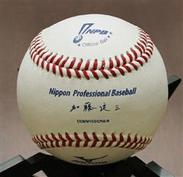 Source: ///sankei.msn.jp.com
Source: ///sankei.msn.jp.com This news did not come as a great surprise to either fans or the players themselves, who noticed since the start of the season that the number of home runs being hit far outstripped those of the previous two seasons when regulations for more ‘pliant’ balls were introduced to prevent teams from indulging in home run derbies (J). What has made this case so special is that until Tuesday the NPB had been telling fans and the media that there were no differences between the balls used this year and those from last year. In order to justify the increase in homers, coaches put it down to a smaller strike zone, meaning that pitchers who had gotten used to a larger strike zone as a result of the introduction of the ‘3 and a half hour rule’ (to end games early in case of shortages in electricity) were making it easier for batters to belt the ball all over the field by pitching to areas now outside the strike zone.
Needless to say, the revelation from the Commissioner himself that this wasn’t the case at all didn’t go down too well with either players or fans, who swamped the NPB homepage with complaints (around 4000 by Thursday, according to the Sankei Shimbun)(J). It, of course, has raised questions as to why the NPB did not address concerns early in the season and conducts tests to ensure that the balls were standard, with some claiming that the NPB allowed the balls to be used to draw in fans, thereby boosting ticket sales (a claim the NPB denies). It also raises questions regarding the number of home runs scored so far this year, and whether the number of home runs an individual player has scored so far this year should be eliminated from their professional record (“Sorry Matt Murton – that homer at Koshien on April 30 giving Hanshin the lead over Hiroshima was rigged”).
If there are any winners from this state of affairs, they are most definitely the pitchers of various teams who have had to grin and bear it as yet more and more of their pitches sailed over outfield fences. Some might have even begun to doubt their throwing abilities, and with it their livelihoods as professional league pitchers. While home runs are all well and good as part of the game, they shouldn’t be held up as the only method of scoring, as they are, and no offence to batters, the ‘dumbest’ (or most certain, depending on your point of view) form of run scoring available in the game of baseball. Hitting short infield bouncers, or ‘Texas leaguers’, and then using a combination of steals and base running ensures a more exciting, dare I say, a more strategic form of baseball than just ‘swinging for the fences’ and hoping for the best.
Ultimately the NPB will offer its apologies and life will move on, but its silence in the face of mounting evidence of use of non-regulation balls will affect its image, and with it the reputation of Japanese baseball for fairness. So far Association Chief Shimoda Kunio has offered his resignation, although no word on whether Commissioner Kato will follow suit. Given that this involves Japanese teams, resignations are considered the most appropriate means of making amends for mistakes (with reinstatement coming some time afterwards). If Commissioner Kato remains where he is, the level of complaints against the NPB will merely escalate and may impact on revenue from games. If that happens, Kato will be shown the door, but the damage will already have been done, as Darvish Yu (currently with the Texas Rangers) fears in this piece. Not good, NPB, not good.
 RSS Feed
RSS Feed